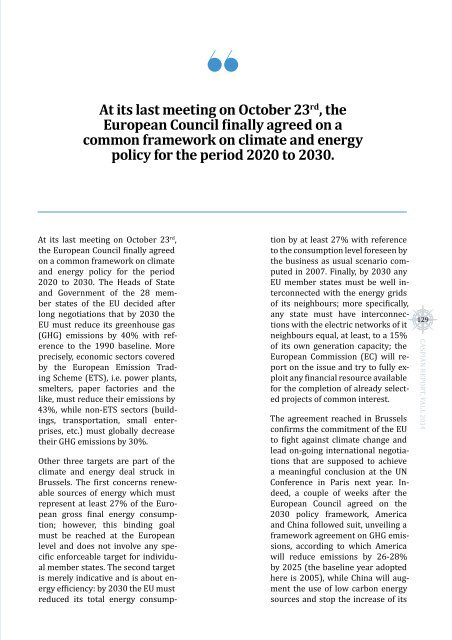Create successful ePaper yourself
Turn your PDF publications into a flip-book with our unique Google optimized e-Paper software.
At its last meeting on October 23 rd , the<br />
European Council finally agreed on a<br />
common framework on climate and energy<br />
policy for the period 2020 to 2030.<br />
At its last meeting on October 23 rd ,<br />
the European Council finally agreed<br />
on a common framework on climate<br />
and energy policy for the period<br />
2020 to 2030. The Heads of State<br />
and Government of the 28 member<br />
states of the EU decided after<br />
long negotiations that by 2030 the<br />
EU must reduce its greenhouse gas<br />
(GHG) emissions by 40% with reference<br />
to the 1990 baseline. More<br />
precisely, economic sectors covered<br />
by the European Emission Trading<br />
Scheme (ETS), i.e. power plants,<br />
smelters, paper factories and the<br />
like, must reduce their emissions by<br />
43%, while non-ETS sectors (buildings,<br />
transportation, small enterprises,<br />
etc.) must globally decrease<br />
their GHG emissions by 30%.<br />
Other three targets are part of the<br />
climate and energy deal struck in<br />
Brussels. The first concerns renewable<br />
sources of energy which must<br />
represent at least 27% of the European<br />
gross final energy consumption;<br />
however, this binding goal<br />
must be reached at the European<br />
level and does not involve any specific<br />
enforceable target for individual<br />
member states. The second target<br />
is merely indicative and is about energy<br />
efficiency: by 2030 the EU must<br />
reduced its total energy consumption<br />
by at least 27% with reference<br />
to the consumption level foreseen by<br />
the business as usual scenario computed<br />
in 2007. Finally, by 2030 any<br />
EU member states must be well interconnected<br />
with the energy grids<br />
of its neighbours; more specifically,<br />
any state must have interconnections<br />
with the electric networks of it<br />
neighbours equal, at least, to a 15%<br />
of its own generation capacity; the<br />
European Commission (EC) will report<br />
on the issue and try to fully exploit<br />
any financial resource available<br />
for the completion of already selected<br />
projects of common interest.<br />
The agreement reached in Brussels<br />
confirms the commitment of the EU<br />
to fight against climate change and<br />
lead on-going international negotiations<br />
that are supposed to achieve<br />
a meaningful conclusion at the UN<br />
Conference in Paris next year. Indeed,<br />
a couple of weeks after the<br />
European Council agreed on the<br />
2030 policy framework, America<br />
and China followed suit, unveiling a<br />
framework agreement on GHG emissions,<br />
according to which America<br />
will reduce emissions by 26-28%<br />
by 2025 (the baseline year adopted<br />
here is 2005), while China will augment<br />
the use of low carbon energy<br />
sources and stop the increase of its<br />
129<br />
CASPIAN REPORT, FALL <strong>2014</strong>










